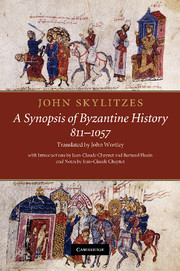Book contents
- Frontmatter
- Contents
- The English translator’s Preface
- Introduction
- Re-writing history: John Skylitzes’ Synopsis historion
- Foreword
- Chapter 1 Michael I Rangabe, the Kouropalates [811–813]
- Chapter 2 Leo V the Armenian [813–820]
- Chapter 3 Michael II the Stammerer [820–829]
- Chapter 4 Theophilos [829–842]
- Chapter 5 Michael III, the son of Theophilos [842–867], and his mother Theodora [842–862]
- Chapter 6 Basil I Kephalas, the Macedonian [867–886]
- Chapter 7 Leo VI the Philosopher (the Wise) [886–912]
- Chapter 8 Alexander [912–913]
- Chapter 9 Constantine VII, Porphyrogennetos [913–959]
- Chapter 10 Romanos I Lekapenos [919–944]
- Chapter 11 Constantine VII [944–959]
- Chapter 12 Romanos II the Younger [959–963]
- Chapter 13 Basil II Bulgaroktonos and Constantine VIII [976–1025]
- Chapter 14 Nikephoros II Phokas [963–969]
- Chapter 15 John I Tzimiskes [969–976]
- Chapter 16 Basil II and Constantine VIII bis [976–1025]
- Chapter 17 Constantine VIII [1025–1028]
- Chapter 18 Romanos III Argyros [1028–1034]
- Chapter 19 Michael IV the Paphlagonian [1034–1041]
- Chapter 20 Michael V Kalaphates [1041–1042]
- Chapter 21 Constantine IX Monomachos [1042–1055]
- Chapter 22 Theodora [1055–1056]
- Chapter 23 Michael VI the Elder/Stratiotikos [1056–1057]
- Glossary
- Bibliography
- Index
Chapter 20 - Michael V Kalaphates [1041–1042]
Published online by Cambridge University Press: 05 July 2014
- Frontmatter
- Contents
- The English translator’s Preface
- Introduction
- Re-writing history: John Skylitzes’ Synopsis historion
- Foreword
- Chapter 1 Michael I Rangabe, the Kouropalates [811–813]
- Chapter 2 Leo V the Armenian [813–820]
- Chapter 3 Michael II the Stammerer [820–829]
- Chapter 4 Theophilos [829–842]
- Chapter 5 Michael III, the son of Theophilos [842–867], and his mother Theodora [842–862]
- Chapter 6 Basil I Kephalas, the Macedonian [867–886]
- Chapter 7 Leo VI the Philosopher (the Wise) [886–912]
- Chapter 8 Alexander [912–913]
- Chapter 9 Constantine VII, Porphyrogennetos [913–959]
- Chapter 10 Romanos I Lekapenos [919–944]
- Chapter 11 Constantine VII [944–959]
- Chapter 12 Romanos II the Younger [959–963]
- Chapter 13 Basil II Bulgaroktonos and Constantine VIII [976–1025]
- Chapter 14 Nikephoros II Phokas [963–969]
- Chapter 15 John I Tzimiskes [969–976]
- Chapter 16 Basil II and Constantine VIII bis [976–1025]
- Chapter 17 Constantine VIII [1025–1028]
- Chapter 18 Romanos III Argyros [1028–1034]
- Chapter 19 Michael IV the Paphlagonian [1034–1041]
- Chapter 20 Michael V Kalaphates [1041–1042]
- Chapter 21 Constantine IX Monomachos [1042–1055]
- Chapter 22 Theodora [1055–1056]
- Chapter 23 Michael VI the Elder/Stratiotikos [1056–1057]
- Glossary
- Bibliography
- Index
Summary
After Michael met his end in that way the supreme power passed to the empress Zoe, she being the heir. She addressed herself with youthful vigour to state business in cooperation with her father’s eunuchs whom the narrative has frequently touched on above. But she did not remain in the same state of mind. Faced with the enormous responsibility of the empire, she realised she could not adequately administer the public business all alone. She thought it was detrimental for such a dominion to be without ruler and director and judged it necessary to procure an emperor capable of dealing with matters in the various circumstances which might arise. For three whole days she considered this matter, then she received as her adoptive son and proclaimed emperor of the Romans the [late] emperor’s nephew and namesake, the son of that Stephen who had ruined the situation in Sicily. [This Michael was already] caesar and seemed to be both a man of action and a capable administrator. She had previously bound him with awesome oaths to hold her as his mistress, his Sovereign Lady and mother for as long as she lived and to do whatever she commanded. She took him as her adopted son and proclaimed him emperor of the Romans, placing the imperial diadem on his brow, but first she got rid of the Orphanotrophos by banishing him to the Monobata monastery.She also relieved Constantine, the domestic of the scholai, of his command, exiling him to his estate of Apsis in the Opsikion theme [417] and likewise sent off the protovestiarios George to his estate in Paphlagonia. In the very same hour at which he received the diadem Michael was afflicted with vertigo and swimming in the head. He almost fell over; they were only just able to revive him with sweet oils, perfumes and other aromatic substances. The earth was a-tremble throughout the four months of his reign. Meanwhile, after he had been crowned by the patriarch and was established as emperor, he conciliated the Senate with honours and promotions, the people with distributions of bounties.
- Type
- Chapter
- Information
- John Skylitzes: A Synopsis of Byzantine History, 811–1057Translation and Notes, pp. 391 - 396Publisher: Cambridge University PressPrint publication year: 2010

